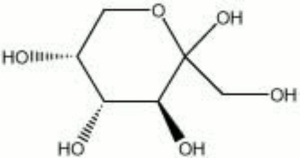Difference between revisions of "Fructose"
Jump to navigation
Jump to search
| Line 10: | Line 10: | ||
== Risks == | == Risks == | ||
| − | Combustible. | + | * Combustible. |
| − | + | * ThermoFisher: [https://www.fishersci.com/store/msds?partNumber=AC161350010&productDescription=D-%28-%29-FRUCTOSE%2C+98%25+1KG&vendorId=VN00032119&countryCode=US&language=en SDS] | |
| − | ThermoFisher: [https://www.fishersci.com/store/msds?partNumber=AC161350010&productDescription=D-%28-%29-FRUCTOSE%2C+98%25+1KG&vendorId=VN00032119&countryCode=US&language=en SDS] | ||
==Physical and Chemical Properties == | ==Physical and Chemical Properties == | ||
| Line 26: | Line 25: | ||
|- | |- | ||
! scope="row"| Melting Point | ! scope="row"| Melting Point | ||
| − | | 103-105(dec) | + | | 103-105 C (dec) |
|- | |- | ||
! scope="row"| Molecular Weight | ! scope="row"| Molecular Weight | ||
Revision as of 12:58, 26 August 2022
Description
A sugar that occurs naturally in fruits and Honey. Fructose forms orthorhombic white crystals when dried from water or alcohol solutions. It is the sweetest of all sugars. Fructose is used as a preservative and for flavoring in food.
Synonyms and Related Terms
fruit sugar; levulose; d-fructopyranose; d-fructose
Risks
- Combustible.
- ThermoFisher: SDS
Physical and Chemical Properties
Soluble in water, ethanol, ether, hot acetone, pyridine, and ethylamine.
| Composition | C6H12O6 |
|---|---|
| CAS | 57-48-7 |
| Melting Point | 103-105 C (dec) |
| Molecular Weight | mol. wt. = 180.16 |
Resources and Citations
- G.S.Brady, Materials Handbook, McGraw-Hill Book Co., New York, 1971 Comment: p. 368
- Richard S. Lewis, Hawley's Condensed Chemical Dictionary, Van Nostrand Reinhold, New York, 10th ed., 1993
- Random House, Webster's Encyclopedic Unabridged Dictionary of the English Language, Grammercy Book, New York, 1997
- The Merck Index, Martha Windholz (ed.), Merck Research Labs, Rahway NJ, 10th edition, 1983 Comment: entry 4295
- The American Heritage Dictionary or Encarta, via Microsoft Bookshelf 98, Microsoft Corp., 1998
